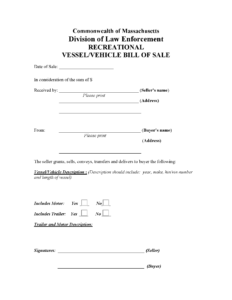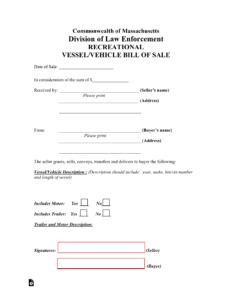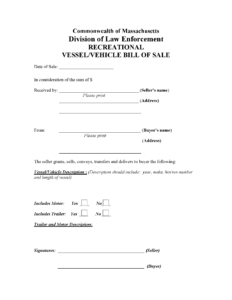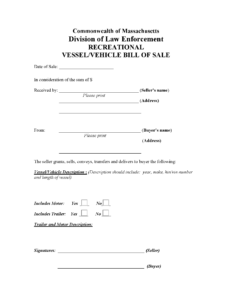Buying or selling a car can be an exciting time, filled with the promise of new adventures on the road or the satisfaction of a successful transaction. However, amidst the excitement, it’s crucial not to overlook the important legal paperwork that ensures a smooth and secure transfer of ownership. One of the most fundamental documents in this process, especially when dealing with private party sales, is a comprehensive bill of sale.
While not always strictly required by the Massachusetts Registry of Motor Vehicles (RMV) for every single transaction, having a clear and accurate bill of sale offers invaluable protection for both the buyer and the seller. It acts as a detailed record of the sale, outlining all the agreed-upon terms and providing proof that the vehicle has indeed changed hands. For anyone navigating a car sale within the Commonwealth, understanding the role and contents of a good bill of sale is incredibly beneficial.
Why You Need a Bill of Sale in Massachusetts for Your Car
A bill of sale, at its core, is a legal document that records the transfer of ownership of personal property from one party to another. When it comes to vehicles, it serves as undeniable proof that the seller has relinquished their rights to the car and the buyer has taken possession and responsibility for it. This simple piece of paper can save a lot of headaches down the road, acting as your official record of the transaction. It clarifies the terms of the sale, the condition of the vehicle at the time of purchase, and the agreed-upon price.
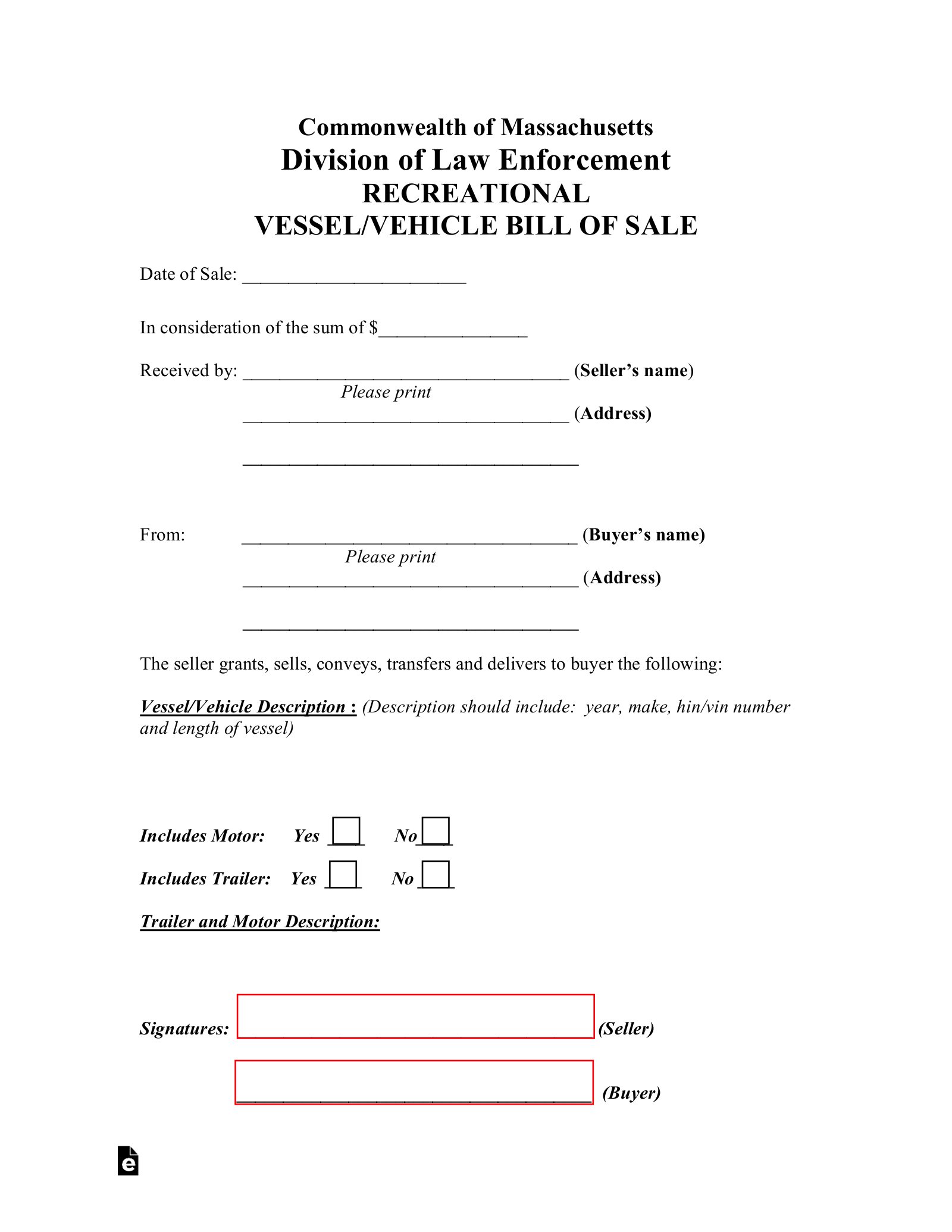
For the seller, a properly executed bill of sale provides a critical shield. Imagine a scenario where, months after selling your car, you receive a parking ticket or toll violation that occurred post-sale. With a dated bill of sale, you have irrefutable evidence of when the vehicle was no longer your responsibility, helping you dispute any erroneous charges. It also finalizes your financial and legal obligation to the vehicle, freeing you from potential future liabilities related to its operation.
Conversely, for the buyer, the bill of sale is equally vital. It confirms your legal ownership of the vehicle, which is often a necessary document when you head to the RMV to register your new ride and apply for a new title. It substantiates the purchase price, which is important for calculating sales tax and also serves as proof of the terms you agreed to, such as the “as-is” condition if applicable. Without it, proving you bought the car, or what you paid for it, can become a real challenge.
While the Massachusetts RMV primarily relies on the vehicle’s title, properly signed and dated, to transfer ownership, they do recommend keeping a bill of sale. Furthermore, many financial institutions, insurance companies, and even some dealerships might ask for one. When considering a bill of sale template for car Massachusetts transactions, ensure it captures all the essential data points.
Key Information to Include on Your Massachusetts Car Bill of Sale
- Full names and addresses of both the seller and the buyer: This ensures clear identification of all parties involved in the transaction.
- Vehicle Identification Number (VIN), make, model, year, and body style: These details uniquely identify the vehicle being sold, preventing any confusion.
- Odometer reading at the time of sale: This is crucial for transparency and often legally required to be disclosed for vehicles under a certain age.
- Purchase price: Clearly state the amount paid for the vehicle, both in numerical and written form, to avoid any misinterpretation.
- Date of sale: The exact date the transaction occurred is vital for legal and financial record-keeping, marking the official transfer of ownership.
- Signatures of both the seller and the buyer: These signatures signify agreement to the terms and completion of the transaction.
- Optional clauses: Consider including a statement regarding the “as-is” condition of the vehicle if there are no warranties, or details about any down payments and remaining balances.
Getting Your Car Registered in Massachusetts: The Role of the Bill of Sale
Once you’ve sealed the deal on your new-to-you car in Massachusetts, the next big step is getting it properly registered and titled with the Registry of Motor Vehicles. This process involves a few key documents and a bit of paperwork, but with everything in order, it can be quite straightforward. Think of the bill of sale as a supporting actor in this play, though a very important one that helps confirm the details of your purchase.
When you visit the RMV to register your vehicle, you’ll generally need the vehicle’s title, which must be properly assigned to you by the previous owner. You’ll also need proof of Massachusetts auto insurance, a completed Application for Registration and Title (Form RMV-1), and often proof of payment of sales tax. This is where your bill of sale truly shines, as it explicitly states the purchase price, which is essential for the sales tax calculation. Massachusetts collects a 6.25% sales tax on the purchase price of the vehicle, or its clean trade-in value, whichever is greater.
The bill of sale acts as a transparent record for the RMV, helping them verify the transaction details, especially the sale price for tax purposes. While the title officially transfers ownership, the bill of sale provides the financial backbone for the transaction. If there’s any discrepancy or question about the sale price on the title, the bill of sale serves as the definitive document. It helps ensure that you pay the correct amount of sales tax, avoiding potential audits or issues down the line.
Remember to bring multiple copies of your bill of sale, along with all your other required documents, to the RMV. It’s always better to be over-prepared than to have to make a second trip! Keeping a copy for your personal records, perhaps even scanning it digitally, is also a smart move. This diligence helps ensure a smooth transition from a purchased vehicle to a legally registered and road-ready car in Massachusetts, giving you peace of mind.
Getting a clear and comprehensive bill of sale is a simple yet powerful step in any car transaction, whether you are the buyer or the seller. It provides a detailed, undeniable record of the transfer, protecting both parties and ensuring a transparent process. Having a well-prepared bill of sale template for car Massachusetts transactions in hand means you’re setting yourself up for a smooth and worry-free experience, from the moment keys are exchanged to successfully completing your registration at the RMV. Make sure this vital document is part of your car buying or selling checklist.
